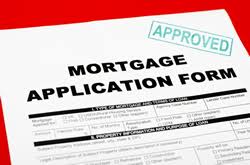
Mortgage Rates Today
Residential Mortgage Application
 Mortgage
rates today. Mortgage rates determine the interest you pay on a home loan. Points, paid upfront, can lower this rate. One point, usually 1% of the loan amount, typically reduces the rate by 0.25%. They’re beneficial if you plan to stay in your home long enough to recoup the cost.
Mortgage
rates today. Mortgage rates determine the interest you pay on a home loan. Points, paid upfront, can lower this rate. One point, usually 1% of the loan amount, typically reduces the rate by 0.25%. They’re beneficial if you plan to stay in your home long enough to recoup the cost.
When you see advertised mortgage rates, focus on the APR rate which indicates the actual mortgage rate plus the amount of points you will pay for your loan. Mortgage rates are always a function of interest rate plus points which are generally added to the loan amount.
Understand the mortgage process
Spend a little time learning about the mortgage process and you will be in command of your loan application. With new laws, greater transparency, and the growing use of electronic systems, borrowers will find much to like in today's mortgage marketplace. Features include online mortgage shopping, lower mortgage rates, and easier-to-compare financial options.
Loan Estimate and Closing Cost Disclosure
The Loan Estimate and Closing Cost Disclosure is a standardized document that must be used by all lenders and given to all loan applicants. This Loan Estimate gives you an estimate of your settlement charges and loan terms if you are approved for a mortgage loan. You can visit the Consumer Finance Protection Bureau web page for a complete explanation of the Loan Estimate document. Take you time understanding the numbers as you can save thousands of dollars in payments by choosing the best loan for you.
The form used for this Loan Estimate must be concise and clear, and the estimates must bear a reasonable relationship to the costs you will likely incur. This information is important for you to know as you evaluate the different mortgage programs being offered to you.
The estimate may be stated as either an exact dollar amount or a dollar range for each charge. (I.e. $800 -$900.) When your lender designates the use of a particular vendor, such as an appraiser, the lender must make its Loan Estimate based upon the lender's knowledge of the amounts charged by that appraiser.
- Homeowners Insurance
As a home buyer, you should determine the cost of homeowners insurance prior to signing a contract for purchase. In many areas the cost of homeowners insurance is significant and may affect the affordability of the house for you.
- Taxes
Generally, a sales listing for a house will include the amount of the real estate taxes paid in the previous year. This information is also available on the website of the local taxing agency. Estimated taxes will also be included in the Loan Estimate Document and as with insurance will have a bearing on the affordability of a house.
Lender Designation of Settlement Service Providers
Some lenders follow the practice of designating specific settlement service providers to be used for legal services, title examination services, title insurance, or the conduct of settlement. Where this occurs the lender, under TILA RESPA, is required to provide you as part of the Loan Estimate a statement in which the lender sets forth:
- The name, address and telephone number of each provider he has designated. This must include a statement of the specific services each designated firm is to provide for you, as well as an estimate of the amount the lender anticipates you will have to pay for the service, based on the lender's experience as to what the designated provider usually charges. If the services or charges are not clear to you, ask further questions.
- The lender must also state whether each designated firm has a business relationship with the lender. While designated firms often provide the services needed, a conflict of interest may exist. Take for example the situation where the provider must choose between your interests and those of the lender. Where legal services are involved, it is wise to employ your own attorney to insure that your interests are properly protected.
Generic Mortgage
Mortgage are pretty much the same and most mortgage lenders use identical loan documents and adhere to the same underwriting requirements. So what is the difference between one lender and another? First and most important is whether the lender will work hard to get you approved and at what interest rate. If you have good credit, you can compare several lenders to get the best rate and points. If your credit is not so good, you main objective will be to get approved for the loan.
Underwriting Standards
 Underwriting standards for
mortgage loans are defined by
government agencies so there is not
too much difference in the approval
process. When you talk to a loan
officer or application taker about
your loan, they should be able to
evaluate your ability to pay during
the application process. What they
won't know is the quality of your
credit or if your income is what you
indicated on the application. Those will be verified
during the underwriting process.
Underwriting standards for
mortgage loans are defined by
government agencies so there is not
too much difference in the approval
process. When you talk to a loan
officer or application taker about
your loan, they should be able to
evaluate your ability to pay during
the application process. What they
won't know is the quality of your
credit or if your income is what you
indicated on the application. Those will be verified
during the underwriting process.
Service
As a borrower you have two concerns about service. First is during the loan approval process and second is after the loan closes. While both are important, poor service after closing is going haunt you for many years. Look to ratings on the Internet to see which lenders score the highest. Always go with quality lenders with proven track records.
Mortgage Loan Variables
As we said earlier, mortgage loans are pretty much the same except they are different when it comes to the interest rate and fees charged by the lender. At application you will get a loan estimate that discloses the interest rate and fees as an APR. This makes it easy to compare lenders. That is the big advantage of using a mortgage company such as Lending Tree. They shop your application to several quality lenders at once, and you get to compare the deals right away.
Taxes and Insurance
Before you close, you must obtain a homeowners insurance policy and supply it to the lender. You will pay for this at closing as well as your share of the real estate taxes for the remaining year. Your loan payment each month will include an amount for your escrow account. This will be determined by the lender and provide funds for your real estate taxes for the next year and your homeowners insurance premium for the next year.
Escrow Account
Mortgage escrow accounts are set up by lenders to collect and hold funds for property taxes and homeowners insurance on behalf of the homeowner. Here’s how the amounts are determined:
Initial Setup: At closing, the lender estimates the yearly costs for taxes and insurance. This estimate is based on the property’s location and the insurance policy chosen. Part of the closing cost will be the amount of money you must place in your mortgage escrow account which is usually equivalent to two months of escrow payments.
Monthly Payments: The estimated yearly cost is divided by 12 to determine the monthly escrow payment. This amount is added to the principal and interest payment of the mortgage.
Annual Review: Lenders review escrow accounts annually to adjust for any changes in tax rates or insurance premiums. If the actual expenses were higher than estimated, you might have to pay the difference. Conversely, if they were lower, you may receive a refund or a reduced payment moving forward1. The goal is to ensure that there’s always enough in the account to cover the bills when they’re due, providing peace of mind for both the lender and the homeowner.